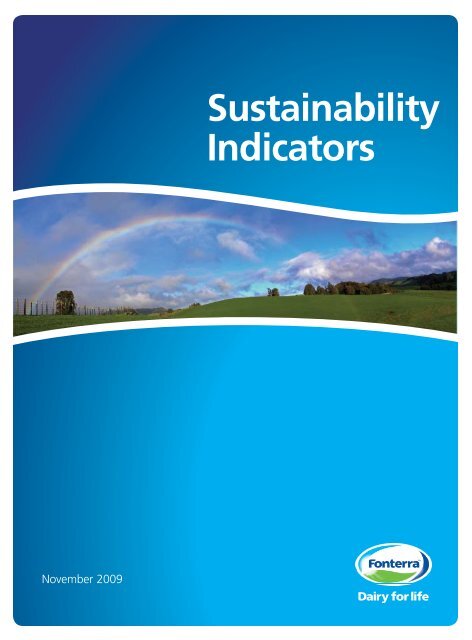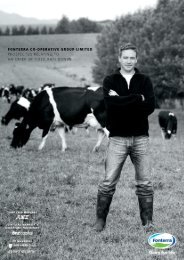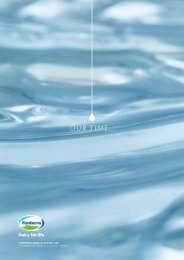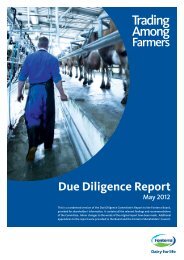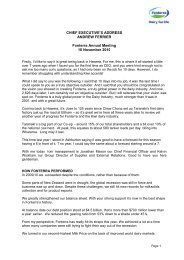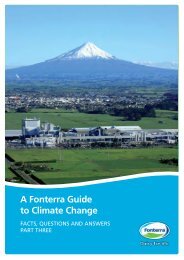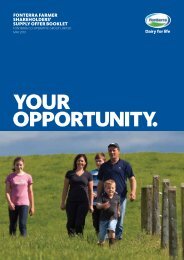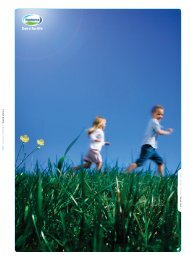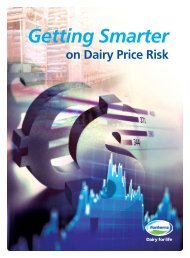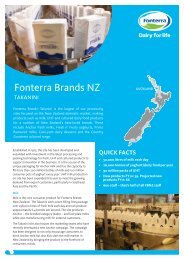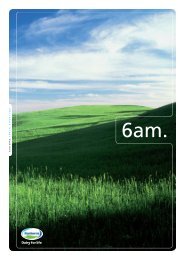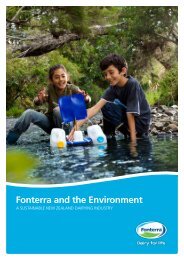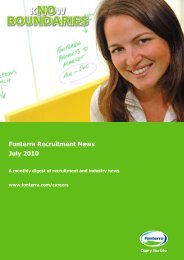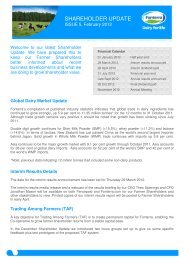Sustainability Indicators - Fonterra
Sustainability Indicators - Fonterra
Sustainability Indicators - Fonterra
Create successful ePaper yourself
Turn your PDF publications into a flip-book with our unique Google optimized e-Paper software.
November 2009<br />
<strong>Sustainability</strong><br />
<strong>Indicators</strong>
ForEwOrd<br />
<strong>Sustainability</strong> is one of the defining business, political and social<br />
issues of the 21st century. <strong>Fonterra</strong>’s business is based on<br />
natural resources, so protecting the environment is integral to<br />
our very existence.<br />
While the protection and enhancement of our natural resources<br />
has always been a focus for <strong>Fonterra</strong>, we recognise the need to<br />
apply a more rigorous approach to this work and better direct<br />
our future efforts.<br />
2<br />
Accordingly, we published <strong>Fonterra</strong>’s <strong>Sustainability</strong> Strategy<br />
for the first time this year, setting out clear goals, strands of<br />
work and programmes. An integral part of this strategy is our<br />
<strong>Indicators</strong> Programme, so we can quantify our progress in<br />
sustainability.<br />
We have identified sustainability indicators from the farm through to manufacturing and final product delivery. They<br />
reflect our performance across the whole business and will help us measure our progress and identify the areas where<br />
we need to improve.<br />
The indicators reflect our environmental and social performance. In time, we propose to widen their reach to<br />
encompass the economic and cultural dimensions of sustainability as well. While the scope of the indicators is currently<br />
limited to <strong>Fonterra</strong>’s New Zealand operations, this will be extended across our global operations in subsequent years.<br />
This report is the first publication of the combined suite of indicators in one place. We intend to report the same<br />
measures each year, showing progress from the previous season and initiatives for the coming year so that our<br />
shareholders, customers and consumers can monitor our progress and hold us to account. By doing this, these<br />
sustainability indicators will help us realise our vision to be at the cutting edge of profitable and sustainable dairying.<br />
Barry Harris<br />
Chair, <strong>Fonterra</strong> <strong>Sustainability</strong> Leadership Team<br />
Novemberr 2009
<strong>Fonterra</strong> <strong>Sustainability</strong> <strong>Indicators</strong> - Scoreboard<br />
2008/09 2009/2010 and Beyond<br />
1. Resource Consumption <strong>Fonterra</strong> is committed to sustaining the<br />
current downward trends of resource<br />
consumption through:<br />
a. Water<br />
• 2.3L water withdrawn per L of raw milk processed<br />
• Water withdrawal from natural sources has remained static on a litre of<br />
milk processed basis since 2006<br />
b. Energy<br />
• 20.4 million GJ of electrical and thermal energy consumed on NZ<br />
manufacturing sites<br />
• Energy consumption has reduced by 13% per tonne product produced<br />
since 2004<br />
c. Materials<br />
• 100% of multiply paper milk powder bags are made from sustainable<br />
forestation mixed with recycled corrugated waste<br />
• Chemical use static over last 2 years per product produced<br />
• Establishing site specific targets for<br />
resource reduction<br />
• Investing in research on resource<br />
recovery options<br />
• Implementing a capital replacement<br />
plan using more efficient technology<br />
• Working collaboratively with our<br />
packaging suppliers to ensure our<br />
packaging conforms with design codes<br />
of compliance for minimal<br />
environmental impact<br />
2. By Product Management <strong>Fonterra</strong> is committed to minimising the<br />
impact of waste streams on our global<br />
environment through:<br />
a. Solid Waste<br />
• 90% of total waste produced was either recycled or reused during 2009<br />
b. Waste Water Management<br />
• 87% of sites using irrigation or biological waste water treatment<br />
systems during 2009<br />
c. GHG Emissions<br />
• Robust process developed for measuring GHG emissions across our<br />
product lifecycle and tested against five bulk products<br />
• Establishing site specific targets for<br />
waste reduction<br />
• Driving stability through our<br />
manufacturing process with a<br />
consequential benefit of loss reduction<br />
• Investing in research and technology to<br />
improve waste treatment capabilities<br />
1<br />
3. Governance <strong>Fonterra</strong> will:<br />
a. <strong>Sustainability</strong> Strategy<br />
• <strong>Fonterra</strong> <strong>Sustainability</strong> Strategy developed and published during 2009<br />
b. Management Systems<br />
• All qualifying <strong>Fonterra</strong> NZ Manufacturing sites are ISO14001 certified<br />
c. Compliance<br />
• 1.6% non complying conditions during 2009<br />
4. On Farm Performance<br />
• Implement its new <strong>Sustainability</strong><br />
Strategy<br />
• Conduct regular internal and external<br />
audits to confirm certification<br />
• Drive reduction in environmental noncompliance<br />
through effective closeout,<br />
staff awareness and training, and<br />
investing in control plants.<br />
a. Clean Streams Accord<br />
• Four of the five Clean Streams Accord targets met (see page 10)<br />
b. Resource Use<br />
Development of programmes to monitor and improve resource<br />
consumption on farms:<br />
• Primary Sector Water Partnership targets<br />
• Irrigation and farm water use efficiency initiatives<br />
• Investigation of on-farm water footprinting options<br />
c. Solid Waste<br />
• Supporting <strong>Fonterra</strong> suppliers to rec ycle agrichemical containers and<br />
silage wrap on farm<br />
Programmes will be introduced or<br />
supported further during the coming year<br />
to further improve on-farm environmental<br />
performance, including:<br />
• Effluent Improvement Programme to<br />
benefit suppliers who comply and assist<br />
non-compliant suppliers<br />
• Dairy Electricity Action Programme<br />
• Water Use Programme<br />
5. Community <strong>Fonterra</strong> is committed to supporting the<br />
• 300 NZ schools (involving 12,000 children) participating in KickStart Breakfast<br />
communities where we live and work via<br />
programmes such as:<br />
• 90 NZ communities visited by the <strong>Fonterra</strong> Science Roadshow in 2009 • Launching the Catchment Care<br />
inspiring 45,000 children to take an interest in science<br />
Waterways for Tomorrow programme<br />
• Support for more than 100 community-based projects in NZ<br />
• Expanding KickStart Breakfast<br />
programme to 500 schools
Resource Consumption<br />
Water<br />
KEY FIGURES<br />
• 2.3 litres of water withdrawn per litre of<br />
raw milk processed<br />
• Fresh water withdrawal has remained static<br />
since 2006 on a litre of milk processed basis<br />
Water Withdrawal<br />
2<br />
<strong>Fonterra</strong>’s New Zealand manufacturing sites withdrew more<br />
than 34 million cubic metres of fresh water during the 2009<br />
season. This equates to 2.3 litres of fresh water per litre<br />
of raw milk processed. The majority of water comes from<br />
rivers and ground water with additional inputs from district<br />
councils.<br />
The fresh water usage per litre of raw milk processed<br />
has remained static since 2006 (as a ratio of raw milk<br />
processed). This result is depressed in real terms as a result<br />
of the change in product mix towards a higher proportion<br />
of specialty milk products. There has been a consequential<br />
change in resource use including more frequent cleaning<br />
relative to the tonnage manufactured, requiring more<br />
water usage.<br />
Water Recycling<br />
While New Zealand is in the fortuitous position of having an<br />
abundant water source, <strong>Fonterra</strong> maintains a healthy respect<br />
for our water sources and uses water recycling technology<br />
wherever it is practical. The quantity of water recycled<br />
within <strong>Fonterra</strong>’s New Zealand manufacturing sites during<br />
the 2009 season is estimated at 2.34 million cubic metres –<br />
this is mostly made up from reverse osmosis and evaporator<br />
condensate.<br />
average water wuthdrawn (L water/L raw milk collected)<br />
5.00<br />
4.50<br />
4.00<br />
3.50<br />
3.00<br />
2.50<br />
2.00<br />
1.50<br />
1.00<br />
0.50<br />
static<br />
For example, up to 2800 cubic metres per day of reverse<br />
osmosis polisher water is reused in manufacturing<br />
operations at the whey plant at our Lichfield site. This<br />
reduces the volume of water required for processing and<br />
also reduces the wastewater volume. The Lichfield site is<br />
working towards self-sufficiency for water consumption in<br />
its whey products plant. Reuse of reverse osmosis polisher<br />
water is currently being investigated at other <strong>Fonterra</strong> sites,<br />
such as Hautapu.<br />
Water is also reused at a number of sites in non-critical<br />
applications. At the Hautapu site, for instance, reuse water<br />
is used for casein washing, in the Milk Protein Concentrate<br />
plant and in cheese manufacturing.<br />
<strong>Fonterra</strong> has a research programme underway to investigate<br />
the reuse of condensates in processing plants. This project is<br />
evaluating advanced oxidation technologies to increase the<br />
range of areas where water can be reused.<br />
0.00<br />
06 07 08 09
Energy<br />
KEY FIGURES<br />
•➢ 20.4 million gigajoules of electrical and thermal energy consumed on New Zealand<br />
manufacturing sites<br />
• 13 per cent reduction in gigajoules per tonne of product since 2004<br />
• Greenhouse emissions reduced by 265,000 tonnes of carbon dioxide equivalent since 2004<br />
(due to energy efficiency gains in processing)<br />
Energy Consumption<br />
The total annual quantity of electrical and thermal energy<br />
consumed by <strong>Fonterra</strong>’s New Zealand manufacturing sites is<br />
20.4 million giga joules. On a per tonne of product basis,<br />
this represents an improvement of 13 per cent since 2004.<br />
GJ Energy/MT produced<br />
12.00<br />
10.00<br />
8.00<br />
6.00<br />
4.00<br />
2.00<br />
13% reduction<br />
assigns a hypothetical dollar value to them and incentivises<br />
their reduction. It is sent out to all managers and energy<br />
efficiency champions at each site for display on staff notice<br />
boards and to encourage friendly competition between sites.<br />
Nine quarterly reports have now been published recording<br />
emissions for each site and for <strong>Fonterra</strong>’s New Zealand<br />
operations as a whole. This proactive approach means we<br />
are going to be in a good position to administer our part of<br />
an emissions trading scheme when it is introduced.<br />
Energy Sources<br />
A quarter of our energy needs is supplied by cogeneration<br />
(sometimes referred to as ‘combined heat and power’),<br />
which is significantly more efficient than obtaining electicity<br />
from the grid and thermal energy from steam generators.<br />
Total energy use is dominated by thermal energy, reflecting<br />
the needs of the evaporation and drying processes involved<br />
with the production of milk powders.<br />
3<br />
0.00<br />
04 05 06 07 08 09<br />
Energy Split 2009<br />
The improved energy use is driven by initiatives such as:<br />
• Systematic analysis of energy needs at each plant<br />
• Installation of heat recovery loops<br />
• Attention to operating practices<br />
• Monitoring and reporting on energy use<br />
Greenhouse Gases<br />
<strong>Fonterra</strong>’s Energy Reduction Project is one of the largest<br />
energy efficiency programmes in the New Zealand industrial<br />
sector. It sets targets for a reduction in energy use per unit<br />
of product, which has resulted in a reduction of 265,000<br />
tonnes of carbon dioxide equivalent since 2004.<br />
<strong>Fonterra</strong>’s Emissions Account compiles data about each<br />
manufacturing site’s carbon dioxide emissions every quarter,<br />
59% Coal, Gas & Oil<br />
9% Grid Electricity<br />
25% Co-gen Steam & Electricity<br />
7% Diesel<br />
Our mix of energy sources has remained in approximately<br />
the same proportion over the last five years.
Materials<br />
KEY FIGURES<br />
• 100 per cent of our multiply paper milk powder bags are made and used in NZ from sustainable<br />
forestation mixed with recycled corrugated waste<br />
• Maintained chemical use over last two years (per product produced basis)<br />
• 15 per cent of our tanker fleet meet Euro 4 emissions standards<br />
4<br />
Ingredients<br />
Milk is, of course, our main ingredient in all our final<br />
products, however we still bring many other ingredients to<br />
our New Zealand manufacturing sites to produce the exact<br />
specifications required by our customers. These ingredients<br />
vary from vitamins, minerals and carbohydrates through to<br />
fats and oils.<br />
The decision making process for procurement of these<br />
ingredients includes an assessment of the sustainability of<br />
different sources of supply.<br />
Packaging<br />
<strong>Fonterra</strong> works closely with our packaging suppliers to<br />
reduce quantities of packaging materials while using a<br />
packaging type that is robust enough to prevent food<br />
spoilage on transit to our customers.<br />
A good example of procurement sustainability in action is<br />
the supply of our multiply paper milk powder bags which<br />
are made and used in New Zealand from sustainable<br />
forestation mixed with recycled corrugated waste.<br />
Various initiatives have led to large savings in packaging<br />
usage including:<br />
Redesign of 20kg<br />
cheese bags<br />
Redesign of 25kg<br />
powder sacks<br />
Redesign of<br />
Anhydrous Milk<br />
Fat pack<br />
115 tonnes plastic/<br />
year reduction<br />
30% reduction in<br />
packaging<br />
Completely<br />
recyclable pack<br />
One example of collaboration between a packaging<br />
company and product manufacture has seen the reduction<br />
of more than 131,000 cheese box bases (per annum) used in<br />
the manufacturing process of cartonless cheese. Previously<br />
an average of 280,000 bases were used per year. With<br />
the introduction of more durable powerply bases we have<br />
reduced the amount of cartons that we have to recycle by<br />
28 tonnes and saved $40,000 and a large amount of labour<br />
throughout the process.<br />
Another successful initiative is that of using a flat pack<br />
carton to deliver cheese bags from our supplier. This carton<br />
does not require taping, which eliminates another waste<br />
stream, and can be reused three times before having to be<br />
recycled, thus reducing cardboard waste by 66 per cent and<br />
saving some 22.5 tonnes of raw material per annum.<br />
Chemicals<br />
Our manufacturing sites carefully monitor every litre of<br />
chemical that is used in the cleaning process. Too much<br />
chemical is not only expensive but it can have negative<br />
impacts on the environment while too little may result in an<br />
unhygienic plant. Ongoing research into maintaining this<br />
fine balance is a key part to our sustainability approach.<br />
<strong>Fonterra</strong>’s New Zealand manufacturing sites used 23,259<br />
million litres of chemical active ingredients for cleaning<br />
during the 2009 season. The chemical consumption has<br />
remained static over the last two years (on a per MT of<br />
product produced basis) despite our product mix moving<br />
towards a higher intensity of nutritional and speciality<br />
products which require a more complex cleaning regime.<br />
<strong>Fonterra</strong> works closely with our suppliers to find chemicals<br />
that have the least impact on the environment while also<br />
being effective cleaners. This includes single stage cleaners,<br />
chemical reuse systems and new cleaning agents.<br />
Fuels<br />
<strong>Fonterra</strong>’s tanker fleet travels over 81 million kilometres to<br />
collect milk for our New Zealand manufacturing sites. Fuel<br />
consumption in our tankers is monitored carefully and plays<br />
an important part in our scheduling – both from a cost<br />
and environmental impact perspective. Recent initiatives to<br />
improve our milk collection efficiency include:<br />
• Pre-concentrating milk prior to transport<br />
• Increasing rail transportation<br />
• Progressively upgrading our tanker fleet to Euro 4<br />
emissions standards (currently 15 per cent meet these<br />
standards)
By-Product Management<br />
KEY FIGURES<br />
• 90 per cent of total solid waste produced on our New Zealand manufacturing sites is recycled<br />
or reused<br />
• Greenhouse gas emissions reduced by 7,450 tonnes over past five years as a result of recycling<br />
• Saved more than $585,000 in landfill costs as result of landfill diversion<br />
• 29.8 million cubic metres of water discharged to rivers and oceans during 2009 season<br />
• 87 per cent of sites with either irrigation or biological wastewater treatment systems<br />
• Carbon footprint methodology formalised: 940g carbon dioxide-equivalent per litre of liquid milk<br />
Waste Management<br />
6<br />
<strong>Fonterra</strong> has an Eco-Efficiency Programme which focuses<br />
on reducing the environmental impact of manufacturing<br />
through redesigning operational systems, re-using<br />
non-recyclable materials and recycling. Each of <strong>Fonterra</strong>’s<br />
New Zealand manufacturing sites has an “Eco-efficiency<br />
Champion”, who runs the programme for their site,<br />
identifying waste streams for potential elimination or<br />
reduction.<br />
During 2009, <strong>Fonterra</strong>’s New Zealand manufacturing sites<br />
reached their target of recycling or reusing 90 per cent<br />
of the total solid waste produced. This resulted in 7,450<br />
tonnes less carbon dioxide emissions than five years ago and<br />
avoided landfill costs of $585,000 for the year.<br />
2009<br />
target<br />
*<br />
Examples of waste reduction initiatives from <strong>Fonterra</strong>’s<br />
Eco-Efficiency Programme include recycling of many types of<br />
plastic that had previously been sent to landfill, such as:<br />
• Petri dishes which are now washed and shredded so that<br />
the expanded polystyrene can be recovered<br />
• Bag house filters and socks containing both stainless<br />
steel and polypropylene, which are now collected,<br />
separated and recycled<br />
• Vacutainer sampling needles, which are shredded and<br />
run through a water bath to separate the outer plastic<br />
container from the inner stainless needle<br />
• Mixed grade sampling bottles that used to be sent to<br />
landfill, which are now collected and reprocessed<br />
• Used powder and cheese bags which are now recovered and<br />
used for a variety of uses such as underground cable covers<br />
This will add to the more than 2000 tonnes of plastic waste<br />
that we are currently diverting from landfill each year.<br />
2008<br />
2007<br />
2006<br />
2005<br />
2004<br />
0% 20% 40% 60% 80% 100%<br />
Proportion of total waste diverted from landfill
<strong>Fonterra</strong> works with a number of community organisations<br />
throughout New Zealand (such as The Abilities Group,<br />
Southland Enterprises, South Waikato Achievement Trust,<br />
Cargill Enterprises and Kilmarnoch Enterprises) which help<br />
facilitate this process, enabling these and other waste<br />
streams to be fully recycled.<br />
As a result of recycling, the amount of waste physically sent<br />
to landfill has reduced significantly since 2005.<br />
Waste Water<br />
Management System<br />
2006 % of<br />
Sites Using<br />
System<br />
2009 % of Sites<br />
Using System<br />
Irrigation to farmland 59% 65%<br />
Biological Treatment 18% 22%<br />
Other System * 23% 13%<br />
Kg landfill/tonne product produced<br />
10.00<br />
9.00<br />
8.00<br />
7.00<br />
6.00<br />
5.00<br />
4.00<br />
3.00<br />
2.00<br />
1.00<br />
0.00<br />
69% reduction<br />
in waste sent<br />
to landfill<br />
05 06 07 08 09<br />
The next step for <strong>Fonterra</strong> is to reduce the total volume of<br />
waste produced from our manufacturing sites recognising<br />
that while recycling/reuse is good, overall reduction is better.<br />
We are doing this by collaborating with our suppliers of<br />
goods and services along with our own manufacturing<br />
teams to identify and eliminate waste wherever possible.<br />
* Other systems include trade waste/municipal treatment<br />
systems and ocean outfalls where <strong>Fonterra</strong> has a formal<br />
agreement with the local council to discharge waste via<br />
these systems.<br />
Greenhouse Gas Emissions<br />
<strong>Fonterra</strong> has recently completed an 18-month long Carbon<br />
Footprint study. This has provided an accurate picture of<br />
the greenhouse gas emissions of our major dairy ingredient<br />
products sourced from New Zealand. Key findings are:<br />
• The carbon footprint is 940 grams of carbon dioxideequivalent<br />
per litre of liquid milk (over five commodity<br />
products measured)<br />
• Approximately 85 per cent of the greenhouse gases are<br />
emitted on the farm<br />
• Milk collection and processing accounts for 10 per cent<br />
of total emissions<br />
• Distribution accounts for 5 per cent of total emissions<br />
7<br />
Waste Water Management<br />
<strong>Fonterra</strong>’s New Zealand manufacturing sites discharged just<br />
under 30 million cubic metres of water to rivers and oceans<br />
during the 2009 season, which equates to 2.0 litres of water<br />
discharged per litre of raw milk processed (this excludes<br />
cooling water discharge).<br />
The water discharged has remained static over the last four<br />
years (on a ratio of litres of milk processed).<br />
All New Zealand manufacturing sites have a continuous<br />
improvement approach to reducing the impacts of<br />
wastewater. All sites continuously monitor their water<br />
discharge and many have expanded or improved their<br />
system of wastewater management over the last four years.<br />
85% Farm emissions<br />
5% Distribution<br />
10% Process & manufacturing<br />
emissions<br />
The study has been an important step towards getting<br />
carbon footprint measuring methodology agreed with key<br />
international dairy organisations and producers so that the<br />
global dairy sector can together contribute to reducing<br />
climate change.
Governance<br />
KEY FIGURES<br />
• ➢<strong>Fonterra</strong> <strong>Sustainability</strong> Strategy developed and published during 2009<br />
• 100 per cent of qualifying sites have ISO14001 accreditation<br />
• 1.6 per cent non complying conditions during 2009 season<br />
Strategic Direction<br />
<strong>Fonterra</strong> published its <strong>Sustainability</strong> Strategy in 2009 to help<br />
realise our vision to be at the leading edge of profitable and<br />
sustainable dairying. The strategy calls for sustainability<br />
principles to be incorporated into <strong>Fonterra</strong> decision making.<br />
It identifies goals and strands of action across all areas of<br />
our business. The four goals are:<br />
• Public support and a confirmed licence to operate our<br />
business model in New Zealand and internationally<br />
• Our record on sustainability adds value to our customers,<br />
consumers and employees<br />
• The same or better opportunities for future generations<br />
of New Zealanders as those enjoyed by current<br />
generations<br />
• Confidence and trust in <strong>Fonterra</strong> as a company<br />
demonstrably committed to sustainability.<br />
The five strands of action are:<br />
• Responding to existing sustainability issues in<br />
New Zealand<br />
• Building an external profile of <strong>Fonterra</strong> as a company<br />
that cares about sustainability<br />
The <strong>Fonterra</strong> <strong>Sustainability</strong> Leadership Team is responsible<br />
for driving sustainable performance across all parts of our<br />
business. It is a cross-business group comprised of senior<br />
members of <strong>Fonterra</strong>’s executive team, and it carries out an<br />
annual stock take on <strong>Fonterra</strong>’s sustainability performance.<br />
Environmental<br />
Management Systems<br />
Environmental management systems provide assurance<br />
that appropriate procedures are in place to minimise<br />
potential adverse environmental or health impacts. All<br />
qualifying <strong>Fonterra</strong> New Zealand manufacturing sites have<br />
comprehensive management systems that cover food safety<br />
(HACCP), product quality management (ISO9000) and<br />
environmental management (ISO14001).<br />
<strong>Fonterra</strong> holds the resource consents and maintains<br />
a comprehensive consent monitoring programme<br />
commensurate with its activities undertaken. While every<br />
intention is made to comply with each and every condition<br />
of these consents, <strong>Fonterra</strong> had 1.6 per cent non complying<br />
conditions during the 2009 season.<br />
10.0%<br />
9.0%<br />
8.0%<br />
9<br />
• Displaying prudent global leadership on issues that<br />
impact the dairy industry’s business model<br />
• Giving priority to those sustainability investments which<br />
make economic sense and positively differentiate the<br />
company<br />
• Growing an internal company culture which recognises<br />
the value of sustainability.<br />
Supporting each strand of action are programmes of work<br />
and indicators, against which our performance can be<br />
measured and reported.<br />
Non complying conditions<br />
7.0%<br />
6.0%<br />
5.0%<br />
4.0%<br />
3.0%<br />
2.0%<br />
1.0%<br />
0.0%<br />
05 06 07 08 09
On-Farm Environmental Impacts 1<br />
2009 KEY FIGURES<br />
• ➢➢80 per cent of farms with waterways excluded all stock<br />
• 98 per cent of regular water crossing points have bridges or culverts<br />
• 99 per cent of farms have nutrient budgets<br />
• 70 per cent of farms fully complied with the management of their farm dairy effluent system<br />
10<br />
Water<br />
A clean water resource is something New Zealanders<br />
take very seriously and <strong>Fonterra</strong> is helping our farmers<br />
keep waterways clean. The Dairying and Clean Streams<br />
Accord (CSA) – a voluntary agreement between <strong>Fonterra</strong>,<br />
regional councils and the Ministries of Agriculture and the<br />
Environment – is our cornerstone initiative in this area.<br />
Five key components of the CSA aim to:<br />
• Exclude all stock from waterways<br />
• Bridge or culvert all regular stock crossings<br />
Regular stock crossing points with Bridges/Culverts<br />
100%<br />
90%<br />
80%<br />
70%<br />
60%<br />
50%<br />
40%<br />
30%<br />
20%<br />
10%<br />
0%<br />
target line<br />
• Eliminate all non-compliant effluent discharge<br />
04 05 06 07 08 09 10 11 12<br />
• Apply nutrients to the land via verified nutrient<br />
management plans<br />
• Protect wetlands.<br />
Farmers totally excluding stock from waterways<br />
100%<br />
90%<br />
80%<br />
70%<br />
60%<br />
50%<br />
40%<br />
30%<br />
20%<br />
10%<br />
0%<br />
target line<br />
Farmers with dairy effluent compliance<br />
100%<br />
90%<br />
80%<br />
70%<br />
60%<br />
50%<br />
40%<br />
30%<br />
20%<br />
10%<br />
0%<br />
target line<br />
04 05 06 07 08 09 11 10 12<br />
04 05 06 07 08 09 10 11 12<br />
1<br />
<strong>Fonterra</strong>, alongside DairyNZ, has some ability to influence the environmental performance of the small independent businesses which make up our supply base<br />
– but there are distinct limits. Our focus is on education and support, as well as investments in research to provide farmers with best practice solutions.<br />
* 07/08 data. 2008/09 data not available at the time of publishing.
Farmers with a nutrient budget<br />
100%<br />
90%<br />
80%<br />
70%<br />
60%<br />
50%<br />
40%<br />
30%<br />
20%<br />
10%<br />
0%<br />
Three of these five components are tracking well against the<br />
target, however the wetland protection component is under<br />
development with councils still identifying the wetlands<br />
concerned. Of more concern is that non compliant farm<br />
dairy effluent discharge is well below optimal.<br />
To address this, <strong>Fonterra</strong> has set up an Effluent Improvement<br />
System (EIS) to encourage non-compliant farms to improve<br />
performance by committing to a management plan or<br />
face a financial deduction and ultimately the possibility of<br />
not having their milk collected. <strong>Fonterra</strong> takes effluent<br />
management very seriously and is working one-on-one with<br />
non-complying farmers to help them improve.<br />
Greenhouse Gases<br />
Generated On-Farm<br />
target line<br />
04 05 06 07 08 09 10 F11 F12<br />
Approximately 85 per cent of the greenhouse gases emitted<br />
for every litre of milk produced come from on-farm activities.<br />
The agricultural sector has already managed to achieve<br />
reductions in greenhouse gas emissions by farming animals<br />
more efficiently. Incremental improvements in the quality<br />
of New Zealand herds have reduced on-farm emissions<br />
by about 1 per cent each year per kilogram of milksolids<br />
produced since 1990.<br />
Possible solutions to further reducing methane production<br />
range from changing the mix of microbes in the rumen<br />
of cattle, to altering diets and selective livestock breeding.<br />
These medium to long term solutions are being investigated<br />
together with a range of research partners.<br />
<strong>Fonterra</strong> is also investing in a research project with other<br />
representatives of the agricultural sector to determine the<br />
effectiveness of nitrification inhibitors in reducing emissions<br />
of the greenhouse gas nitrous oxide.<br />
Other On-Farm Initiatives<br />
<strong>Fonterra</strong> is involved in many other initiatives that assist<br />
New Zealand farmers to protect the environment and run<br />
their businesses more efficiently.<br />
Efficient Water Use<br />
A joint DairyNZ/Environment Waikato/<strong>Fonterra</strong> project<br />
is developing a water use efficiency programme to help<br />
farmers set up and maintain farm water infrastructure to<br />
ensure water is used efficiently with minimal leakage from<br />
the farm system.<br />
In addition, the National Environmental Standard on water<br />
measurement devices will help improve the management of<br />
fresh water by ensuring accurate measure of the extent of<br />
water withdrawal from natural sources.<br />
<strong>Fonterra</strong> and others are working with Standards New<br />
Zealand to investigate the development of an ISO<br />
Water Footprinting Standard. Once a commonly<br />
agreed methodology for water footprinting is identified,<br />
consideration will be given to determining the water<br />
footprint of a number of <strong>Fonterra</strong> products to identify areas<br />
of the production chain that offer an opportunity for water<br />
use reduction.<br />
Recycling of Farm Waste<br />
A <strong>Fonterra</strong> representative currently chairs Agrecovery, a<br />
broad-based organisation that provides nationwide solutions<br />
for container, chemical and wrap recovery and recycling<br />
programmes. Through Agrecovery dairy farmers have access<br />
to recycling programmes that address the difficult task<br />
of disposing of chemical containers and silage wrap in a<br />
sustainable way.<br />
<strong>Fonterra</strong> is expecting to see increased participation<br />
from dairy farmers in Agrecovery’s recycling programme<br />
following the launch of its nationwide silage wrap recycling<br />
programme during 2009 plus the continuation of the Agpac<br />
silage wrap recycling programme. All <strong>Fonterra</strong>-owned farms<br />
have a silage wrap recovery system in place on farm.<br />
An extension to the Agrecovery rural recycling programme<br />
was launched in July 2009, providing a nationwide<br />
system for the collection and disposal of unwanted and<br />
expired chemicals in agriculture. The programme gives all<br />
agrichemical users a safe and effective means to ensure<br />
farm waste is dealt with in a sustainable and fully compliant<br />
manner.<br />
Global Involvement<br />
<strong>Fonterra</strong> has a strong involvement in Sustainable Agriculture<br />
Initiative (SAI), an organisation created by the food industry<br />
to support the development of sustainable agriculture,<br />
involving the different stakeholders of the food chain.<br />
SAI supports agricultural practices and agricultural<br />
production systems that preserve the future availability of<br />
current resources and enhance their efficiency.<br />
SAI is currently establishing a set of indicators that will<br />
become the globally accepted guidelines for measuring<br />
sustainability in agriculture. <strong>Fonterra</strong> is closely involved in<br />
the establishment of these indicators.<br />
11
Community<br />
2009 KEY FIGURES<br />
· 300 New Zealand decile 1-4 schools participating in KickStart Breakfast programme, nourishing<br />
over 12,000 children<br />
· 90 New Zealand communities visited by the <strong>Fonterra</strong> Science Roadshow, inspiring 45,000 children to<br />
take an interest in science<br />
· 20 of our New Zealand sites participated in Keep New Zealand Beautiful week<br />
· Support for more than 100 New Zealand community-based projects, including education,<br />
environment and local emergency response services<br />
Our grass roots and connection with our rural communities has always meant a close relationship between farmers,<br />
factories and the wider community. This relationship is vitally important to <strong>Fonterra</strong> and one we want to maintain and<br />
grow. We support our local communities through a number of initiatives, including:<br />
12<br />
KickStart Breakfast<br />
<strong>Fonterra</strong> is committed to helping people become stronger,<br />
healthier and more active through promoting balanced<br />
health and nutrition with the goodness of dairy. An<br />
example of this is our KickStart Breakfast programme, a<br />
partnership with Sanitarium, schools and communities<br />
around New Zealand.<br />
Studies have found around one in five New Zealand<br />
families are living in poverty and more than 10 per cent of<br />
school children are starting the day on an empty stomach.<br />
Our partnership with Sanitarium is helping 12,000 children<br />
at more than 300 schools across New Zealand kick start<br />
their day with free Weet-Bix and Anchor Mega Milk. That’s<br />
over 24,000 breakfasts a week!<br />
The KickStart Breakfast programme provides breakfast to<br />
breakfast clubs for one or two days a week. The intention<br />
is to educate children about the difference eating breakfast<br />
makes to concentration and energy levels and for kids to<br />
share this learning with their families.<br />
Anchor Mega Milk and Weet-Bix are the perfect<br />
combination for breakfast, being high in protein, calcium,<br />
vitamin D, B vitamins, iron and wholegrains to provide both<br />
strength and energy for maximum learning.<br />
K<br />
breakfast
<strong>Fonterra</strong> Science Roadshow<br />
We foster future technologists, scientists and engineers by<br />
inspiring 45,000 children every year through live science<br />
demonstrations and interactive exhibits at the <strong>Fonterra</strong><br />
Science Roadshow.<br />
partnered with a company which provides each student with<br />
part-time work. Students commit to saving $1200 a year<br />
from their job with their partnering organisation which also<br />
contributes an agreed amount to help meet the student’s<br />
tertiary fees. Students are supported by mentors and their<br />
progress is monitored by the Foundation. <strong>Fonterra</strong> currently<br />
provides three First Foundation scholarships.<br />
Environmental Awareness<br />
<strong>Fonterra</strong> has a programme of events designed to increase<br />
the environmental awareness of our people. The desire<br />
is that “caring for our environment” becomes a natural<br />
part of the way we work, live and play. This starts with<br />
an environmental induction for new employees and is<br />
supplemented by ongoing environmental programmes and<br />
information. Some key initiatives include:<br />
Keep NZ Beautiful<br />
All our New Zealand sites are invited to participate in the<br />
Keep New Zealand Beautiful cleanup week in September<br />
each year where we make a difference by picking up litter<br />
on the roads, parks, reserves and beaches around processing<br />
sites. This year 20 of our 22 sites participated.<br />
Green Matters<br />
Green Matters is a quarterly publication for <strong>Fonterra</strong> staff,<br />
which ensures they are aware of the environmental work we<br />
are engaged in. In addition we encourage staff involvement in<br />
the setting of environmental objectives and targets and all site<br />
meetings have an environmental item included in the agenda.<br />
13<br />
December 2008 research showed that New Zealand primary<br />
school children’s science achievement has declined in recent<br />
years. Science, technology and innovation are fundamental<br />
to <strong>Fonterra</strong>’s business and we are proud to be inspiring<br />
children with hands-on science through our sponsorship of<br />
this valuable education programme.<br />
Every year, the Roadshow is visited by more than 200<br />
schools in 90 communities across New Zealand providing<br />
children aged 8-13 the opportunity to explore science<br />
principles through an exciting collection of hands-on<br />
exhibits, science demonstrations and classroom resources.<br />
Designed to complement the existing education<br />
programme in schools, <strong>Fonterra</strong>'s support is providing<br />
new enhancements to the programme and helping the<br />
Roadshow reach a greater number of communities.<br />
First Foundation<br />
<strong>Fonterra</strong> is a Partnering Organisation with The First<br />
Foundation, an educational trust which provides scholarships<br />
for talented students from low decile schools whose<br />
financial circumstances stand in the way of them pursuing a<br />
university degree.<br />
In a First Foundation Scholarship, students in their final year<br />
of college engage in a four year scheme in which they are<br />
<strong>Fonterra</strong> Catchment Care – Waterways for<br />
Tomorrow<br />
Catchment care was launched in October 2009 in<br />
partnership with non-profit organisation Conservation<br />
Volunteers and our communities. We will be working<br />
in rural communities alongside landowners, councils and<br />
community groups on projects that enhance and protect<br />
waterways and wetlands. This includes planting, weeding,<br />
maintaining and fencing iconic water catchment areas.<br />
Our target is to improve over 1,000,000 square metres of<br />
waterways and wetlands every year in New Zealand.<br />
New Zealand Community Site Relations<br />
Programme<br />
We recognise the importance of supporting the local<br />
communities in which we live and work. Every year we<br />
sponsor a range of community-based projects, focusing<br />
on education, environment and local emergency response<br />
services where our staff and our shareholder farmers live and<br />
work. This includes assisting community groups and schools<br />
in projects such as providing worm farms and recycling<br />
facilities for local schools, donating seedlings and staff<br />
time to riparian planting programmes, sponsoring regional<br />
science fairs and education projects and sponsoring or<br />
donating products for rural events such as calf club days.


